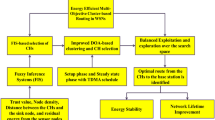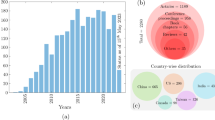Abstract
Nodes of wireless ad-hoc networks are generally equipped with batteries. This makes energy a scarce resource. Therefore, power consumption of network operations is critical and subject to optimization. One of the fundamental problems in ad-hoc networks is multicasting. In this work, we consider the so-called minimum energy multicast (MEM) problem in static ad-hoc networks. This problem can be stated as a combinatorial optimization problem. We develop an ant colony optimization algorithm for networks with omni-directional as well as directional antennas. The results show that our algorithm consistently outperforms existing techniques.
Similar content being viewed by others
References
Al-Shihabi, S., Merz, P., & Wolf, S. (2008). Nested partitioning for the minimum energy broadcast. In V. Maniezzo, R. Battiti, & J.-P. Watson (Eds.), Lecture notes in computer science: Vol. 5313. Post-proceedings of LION 2007—learning and intelligent optimization (pp. 1–11). Berlin: Springer.
Blum, C., & Dorigo, M. (2004). The hyper-cube framework for ant colony optimization. IEEE Transactions on Systems, Man and Cybernetics, Part B, 34(2), 1161–1172.
Cartigny, J., Simplot, D., & Stojmenovic, I. (2004). An adaptive localized scheme for energy-efficient broadcasting in ad hoc networks with directional antennas. In I. G. Niemegeers & S. M. Heemstra de Groot (Eds.), Lecture notes in computer science: Vol. 3260. Proceedings of PWC 2004—9th IFIP international conference on personal wireless communications (pp. 399–413). Berlin: Springer.
Das, A. K., Marks, R. J., El-Sharkawi, M., Arabshahi, P., & Gray, A. (2002). The minimum power broadcast problem in wireless networks: an ant colony system approach. In Proceedings of the IEEE CAS workshop on wireless communications and networking (pp. 5–6). Los Alamitos: IEEE Computer Society.
Das, A. K., Marks, R. J., El-Sharkawi, M., Arabshahi, P., & Gray, A. (2003). r-shrink: a heuristic for improving minimum power broadcast trees in wireless networks. In Proceedings of GLOBECOM 2003—global telecommunications conference (pp. 523–527). Los Alamitos: IEEE Computer Society.
Dorigo, M., & Stützle, T. (2004). Ant colony optimization. Cambridge: MIT Press.
Guo, S., & Yang, O. (2004). A dynamic multicast tree reconstruction algorithm for minimum-energy multicasting in wireless ad hoc networks. In Proceedings of IPCCC 2004—IEEE international conference on performance, computing, and communications (pp. 637–642). Los Alamitos: IEEE Computer Society.
Guo, S., & Yang, O. (2005). Improving energy efficiency for multicasting in ad-hoc networks with directional antennas. In Proceedings of IEEE WiMob 2005—wireless and mobile computing, networking and communications (pp. 344–351). Los Alamitos: IEEE Computer Society.
Guo, S., & Yang, O. (2006). Minimum-energy multicast in wireless ad hoc networks with adaptive antennas: MILP formulations and heuristic algorithms. IEEE Transactions on Mobile Computing, 5(4), 333–346.
Guo, S., & Yang, O. W. W. (2007). Energy-aware multicasting in wireless ad hoc networks: a survey and discussion. Computer Communications, 30, 2129–2148.
Hansen, P., & Mladenović, N. (2001). Variable neighborhood search: principles and applications. European Journal of Operational Research, 130, 449–467.
Hernández, H. (2008). Minimum energy multicasting/broadcasting in wireless ad-hoc networks. Master thesis, Departament de Llenguatges i Sistemes Informàtics, Universitat Politècnica de Catalunya, Barcelona, Spain.
Hernández, H., & Blum, C. (2008). Energy-efficient multicasting in wireless ad-hoc networks: An ant colony optimization approach. In G. Qu, K. Gudmundsson, & S. Torsteinsson (Eds.), Proceedings of ISWCS 2008—IEEE international symposium on wireless communication systems (pp. 667–671). Los Alamitos: IEEE Computer Society.
Hernández, H., Blum, C., & Francés, G. (2008). Ant colony optimization for energy-efficient broadcasting in ad-hoc network. In M. Dorigo, M. Birattari, C. Blum, M. Clerc, T. Stützle, & A. Winfield (Eds.), Lecture notes in computer science: Vol. 5217. Proceedings of ANTS 2008—sixth international conference on ant colony optimization and swarm intelligence (pp. 25–36). Berlin: Springer.
Kang, I., & Poovendran, R. (2005). Iterated local optimization for minimum energy broadcast. In Proceedings of WiOpt 2005—third international symposium on modeling and optimization in mobile, ad hoc, and wireless networks (pp. 332–341). Los Alamitos: IEEE Computer Society.
Li, F., & Nikolaidis, I. (2001). On minimum-energy broadcasting in all-wireless networks. In Proceedings of the IEEE conference on local computer networks (pp. 14–16). Los Alamitos: IEEE Computer Society.
Liang, W. (2002). Constructing minimum-energy broadcast trees in wireless ad hoc networks. In Proceedings of ACM MobiHoc 2002—ACM symposium on mobile ad hoc networking and computing (pp. 112–122). New York: ACM.
Rapport, T. (1996). Wireless communications: principles and practices. Englewood Cliffs: Prentice Hall.
Wan, P. J., Calinescu, G., Li, X. Y., & Frieder, O. (2002). Minimum-energy broadcasting in static ad hoc wireless networks. Wireless Networks, 8(6), 607–617.
Wan, P. J., Calinescu, G., Li, X., & Frieder, O. (2004). Minimum-energy multicast in routing in static ad hoc wireless networks. IEEE/ACM Transactions on Networking, 12(3), 507–514.
Wang, B., & Gupta, S. K. S. (2003). S-REMiT: a distributed algorithm for source-based energy efficient multicasting in wireless ad hoc networks. In Proceedings of IEEE GLOBECOM 2003—global telecommunications conference (Vol. 6, pp. 3519–3524). Los Alamitos: IEEE Computer Society.
Wieselthier, J. E., Nguyen, G. D., & Ephremides, A. (2000). On the construction of energy-efficient broadcast and multicast trees in wireless networks. In Proceedings of INFOCOM 2000—nineteenth annual joint conference of the IEEE computer and communications societies (Vol. 2, pp. 585–594). Los Alamitos: IEEE Computer Society.
Wieselthier, J. E., Nguyen, G. D., & Ephremides, A. (2001). Algorithms for energy-efficient multicasting in static ad hoc wireless networks. Mobile Networks and Applications, 6(3), 251–263.
Wieselthier, J. E., Nguyen, G. D., & Ephremides, A. (2002). Energy-aware wireless networking with directional antennas: the case of session-based broadcasting and multicasting. IEEE Transactions on Mobile Computing, 1(3), 176–191.
Wolf, S., & Merz, P. (2008). Evolutionary local search for the minimum energy broadcast problem. In C. Cotta & J. van Hemert (Eds.), Lecture notes in computer science: Vol. 4972. Proceedings of voCOP 2008—eighth European conference on evolutionary computation in combinatorial optimisation (pp. 61–72). Berlin: Springer.
Author information
Authors and Affiliations
Corresponding author
Additional information
This work was supported by grant TIN2007-66523 (FORMALISM) of the Spanish Government, and by the EU project FRONTS (FP7-ICT-2007-1) funded by the European Commission under the FET Proactive Initiative Pervasive Adaptation. In addition, Christian Blum acknowledges support from the Ramón y Cajal program of the Spanish Ministry of Science and Innovation, and Hugo Hernández acknowledges support from the Catalan Government through an FI grant.
Rights and permissions
About this article
Cite this article
Hernández, H., Blum, C. Ant colony optimization for multicasting in static wireless ad-hoc networks. Swarm Intell 3, 125–148 (2009). https://doi.org/10.1007/s11721-009-0027-7
Received:
Accepted:
Published:
Issue Date:
DOI: https://doi.org/10.1007/s11721-009-0027-7




